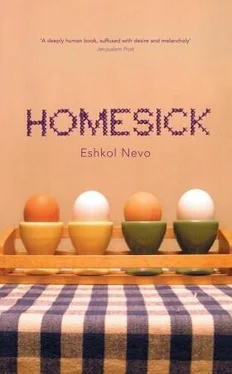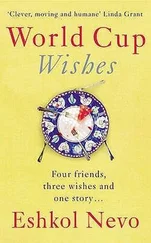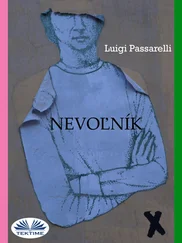Eshkol Nevo - Homesick
Здесь есть возможность читать онлайн «Eshkol Nevo - Homesick» весь текст электронной книги совершенно бесплатно (целиком полную версию без сокращений). В некоторых случаях можно слушать аудио, скачать через торрент в формате fb2 и присутствует краткое содержание. Год выпуска: 0101, ISBN: 0101, Издательство: Random House, Жанр: Современная проза, на английском языке. Описание произведения, (предисловие) а так же отзывы посетителей доступны на портале библиотеки ЛибКат.
- Название:Homesick
- Автор:
- Издательство:Random House
- Жанр:
- Год:0101
- ISBN:9781448180370
- Рейтинг книги:5 / 5. Голосов: 1
-
Избранное:Добавить в избранное
- Отзывы:
-
Ваша оценка:
- 100
- 1
- 2
- 3
- 4
- 5
Homesick: краткое содержание, описание и аннотация
Предлагаем к чтению аннотацию, описание, краткое содержание или предисловие (зависит от того, что написал сам автор книги «Homesick»). Если вы не нашли необходимую информацию о книге — напишите в комментариях, мы постараемся отыскать её.
Homesick
Homesick — читать онлайн бесплатно полную книгу (весь текст) целиком
Ниже представлен текст книги, разбитый по страницам. Система сохранения места последней прочитанной страницы, позволяет с удобством читать онлайн бесплатно книгу «Homesick», без необходимости каждый раз заново искать на чём Вы остановились. Поставьте закладку, и сможете в любой момент перейти на страницу, на которой закончили чтение.
Интервал:
Закладка:
Suddenly, my mouth was full of the words I hadn’t been able to say when the television crew was there, all the sentences that had been stuck in my throat like cement. That’s a sad joke, I said in a strong voice, like Gamal Abd al-Nasser in his good days. What’s happening here is a sad joke, but one day it’ll end, one day the strong will be weak and the weak will be strong, and then none of you will laugh any more, believe me, none of you will laugh.
Maybe some day that’ll happen, the short policeman said and grabbed my arm hard, but meanwhile, mister, you’re under arrest.
They put the handcuffs on me, dragged me out of the house and slapped me when I tried to resist. They pulled the chain out of my pocket and threw me into the police car. They blindfolded me with a handkerchief and slapped me again, harder, for the fun of it, and cursed me in Arabic the whole time — the Jews always curse in Arabic — and took me to the Russian Compound, to an investigator who wanted to know what organisation I belonged to, Fatah or Hamas, or maybe to the Popular Front, and I told him I’m just one man, alone, no organisation. He slapped me — the third slap — and kept at it. Isn’t it too bad for your family? he said, your children? Give me the name of your chief now and I’ll make sure you won’t get more than a year inside, and I said, what chief? What do you want? I didn’t do anything. What are you charging me with? And he said, oh man, we’ve got ourselves a smart-arse here, and without warning, like a football player kicking from where he’s standing, he gave me the fourth slap and yelled, who do you think you are? You have two choices, either you co-operate willingly or you co-operate unwillingly, which will it be? And I said, I didn’t do anything, no one sent me, I don’t know what you want from me. He got up and paced around the room to make me nervous. Then he went out and said to the guards waiting outside, take him to a cell, and the guards came in and blindfolded me again and dragged me through hallways that smelt of detergent. They took off the blindfold and gave me a fifth slap, you stinking Arab, and threw me into a small cell with Arabic writing on the walls and the smell of piss. But I didn’t care, because my heart was filled with happiness that I’d been in my house, that I’d gone back to my home and did what my mother asked. I’d gone into all the rooms and found the chain and made a big stink and they filmed it and it would probably be on television, on the evening news. For the first time, they’d see an Arab talking on television about his home, and the whole world would listen. The whole village would be proud of me.
There was a small TV set outside the cell, for the guards. I couldn’t see the screen because the guards had turned it towards them, but I could hear. From the kind of talking I heard, I guessed the news would be on very soon. First there was a quiz with organ music and loud applause after every sentence. Then they talked about food, and a woman talked about a British film they made in a large castle not far from London. Then there was the sports announcer, and I put a hand behind my ear so I could hear how many goals Liverpool had scored against Everton. Then, half an hour before the time I guessed the eight o’clock news would go on, there was trumpet music all of a sudden, and the guard called his friend, hey, there’s a newsflash. Looks to me like something happened.
There was hope in my heart: maybe the newsflash was about me? Maybe they’d tell about the policeman who shot at an Arab inside a house?
It turned out to be a suicide bombing. In Jerusalem. Lots of injured people. The number of dead unknown. The second bombing in the capital coming hard on the heels of a previous attack, the broadcaster said, and then the rest of the news started. I kept on listening. I hoped that maybe between reports from one hospital and another, they’d stick in a little item about what happened in el-Castel today, but they didn’t say anything about it. Abadan . A lost cause. I was done for. I felt like someone who tried to jump on a donkey and fell off the other side. What did I make that whole scene for? What good did it do? I couldn’t even bring my mother the chain. And what would Nehila do now? Where would she get money to buy food? There was nothing left in the house that she could sell. And little Imad would be starting school next year. We needed money for his books, for clothes. And who’d bring the money if not his father?
One of the guards who was watching television came over to my cell, looked at me with red eyes and spat in my face. You son-of-a-bitch, you’re all sons-of-bitches. Force is the only thing you understand, only force.
I went to the back of the cell and sat down on a stained mattress.
He kept spitting at me and called his friend to join him: come on, man, a little target practice.
I covered my face with my hands. I felt as if someone was sticking a needle into my vein and injecting me with hatred.
They kept on spitting, collected all the saliva they had in their mouths and throats and hurled it at me. It was a ‘bulls’-eye’ when they got my face, a ‘hit’ when they got my body. I knew that game from my days in prison.
*
A storm is raging around us: Ovadia goes over to Ronen to ask him something about black holes, then changes his mind. Then goes over to him again. And changes his mind again. Joe and Zachi are having a loud, aggressive argument about whether you can move backwards to capture a piece in draughts. Nava tries to calm them down before one of them grabs someone else by the throat. Gideon the speechmaker is making a speech to the entire room. He’s holding a tattered book he took from the club’s small library and reading, putting the stress in the wrong places, something by A.D. Gordon. Some of the people in the room cheer him on. Some order him to shut up. Shmuel and I try to ignore all of it. We’re engrossed in conversation, our heads bent, our voices lowered. A thin, invisible bubble surrounds us, separating us from the commotion in the room. But what hurts you , Shmuel? I ask him, and he suddenly stops talking. He’s just finished giving me another lecture on his theory of colours, and out of an uncontrollable urge — how many times can you listen to the theory that the world is divided into red, white and transparent — that direct question suddenly comes out of my mouth. He takes off his cracked glasses and wipes them with his shirt. Without them, he looks younger and more lost. He puts his glasses back on, stares straight ahead and says nothing. His knee is jerking nervously, and he says nothing. It’s possible that he didn’t hear. And it’s possible that it’s too soon. That not enough trust has been created between us for him to share with me what’s really bothering him. But how can trust be created when every week I have to remind him all over again what my name is? Besides, maybe his theories were not meant to hide anything deeper, maybe the theories are the thing itself. And why is he the one I’ve latched on to? Of all the suffering people here, why him?
Look, my friend, he says, trying to please me, as if he senses that I’m about to give up on him, you asked me a tough question. And it’s not that I don’t know the answer. I know it very well. So what’s the problem, Shmuel? I ask, and immediately regret the question because there he is, taking off his glasses again and turning his face away from me, wrapping himself in that silence of his. Don’t push him, idiot, don’t push. The problem is, he says to me — thank God, I haven’t lost him yet — that what I’m about to say will make you doubt me. You’ll say to yourself that Shmuel is crazy, disturbed. And what do you think I say to myself now, with all your weird theories? the cynic inside me replies, while I myself am silent. If he wants to, he’ll talk. The pain, he finally says after another silence and a twitch that closes his right eye, the pain isn’t actually my pain, but all the pain that exists in the world. Oh no, I wince, he’s going to come out with a new theory. Should I interrupt him now? I don’t mean the ‘world’ in cosmic terms, he reassures me, but more the people who fill the world with their pain. You see, in every person’s chest there is a sun of pain and sorrow, and that sun radiates fiery rays. If you’re well protected, those rays don’t penetrate you. But if you’re not protected, the pain of the people close to you enters you and burns you from inside. And you just don’t have any sunblock to slather on your skin? I ask, and realise right away that my tone is wrong, that my attempt at humour is inappropriate here. I don’t have that layer of skin, he corrects me without any anger. There’s no protective skin between me and the misery in the world. To tell you the truth, he says, bringing his mouth to my ear as if whispering a secret, I did have skin like that. But a few years ago, it melted away and left me exposed to all the rays that strangers radiate at me. Wow, I say and put my hand on my chest to stop the pounding of my heart, what you’re telling me, it doesn’t sound easy. No it isn’t, Shmuel nods, scratching his head fiercely, hurting himself. From the other side of the room, Nava signals to me with her hand on her watch that the time is almost up, we have to start arranging the chairs. Why the pressure? Doesn’t she see that I’m in the middle of a conversation? Tell me, I say, ignoring her and turning to Shmuel, can you give me an example? An example of what? he asks, watching Nava fearfully as she hurries the other members to leave. An example of a person, I say, talking faster, a person you find it hard to be near because you feel that his pain is too strong, that it’s blazing too hot for you.
Читать дальшеИнтервал:
Закладка:
Похожие книги на «Homesick»
Представляем Вашему вниманию похожие книги на «Homesick» списком для выбора. Мы отобрали схожую по названию и смыслу литературу в надежде предоставить читателям больше вариантов отыскать новые, интересные, ещё непрочитанные произведения.
Обсуждение, отзывы о книге «Homesick» и просто собственные мнения читателей. Оставьте ваши комментарии, напишите, что Вы думаете о произведении, его смысле или главных героях. Укажите что конкретно понравилось, а что нет, и почему Вы так считаете.












